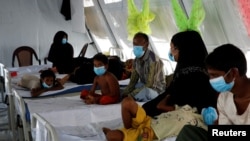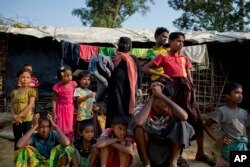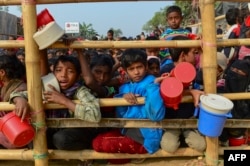The U.N. children’s fund warns more than one-half million Rohingya refugee children in Cox’s Bazar, Bangladesh, are at risk of disease outbreaks leading to many deaths during the upcoming cyclone and monsoon season.
Bangladesh gets battered by tropical storms during two seasons every year. Aid agencies in Cox’s Bazar are looking ahead with dread toward the first cyclone and monsoon season, which begins in March and lasts through July.
They warn more than 650,000 Rohingya refugees living in overcrowded, squalid, makeshift settlements are totally unprepared to deal with the extensive storm damage and destruction that is likely to occur.
U.N. children’s fund spokesman, Christophe Boulierac, says the health and safety of hundreds of thousands of children already living in horrific conditions will be at increased risk. He says the monsoon season will bring with it disease, flooding landslides and further displacement.
“What is already a dire humanitarian situation for children, for the 520,000 children now living in the region of Cox’s Bazar can become catastrophic with cyclones and the monsoon in a few weeks,” he said.
Aid officials say unsafe water, inadequate sanitation and poor hygiene can lead to devastating disease outbreaks and a worsening of existing infections and deaths from cholera and diphtheria. They say stagnant pools of water can attract malaria-carrying mosquitoes.
UNICEF says keeping the Rohingya refugee children safe from disease is an absolute priority. It reports efforts are being made to provide access to safe water and sanitation and to vaccinate children against the spread of killer diseases, such as diphtheria. But it warns this is likely not to be enough to ward off the worst impacts caused by extreme weather.






